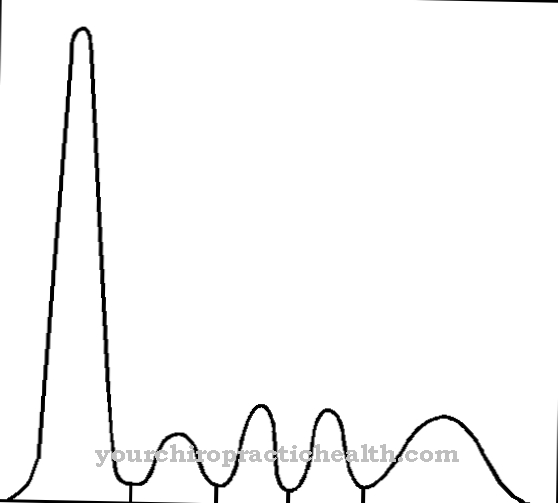The Dysthymia is a so-called mood disorder and is also called dysthymic disorder or chronic depression designated. It has a lot in common with "ordinary" depression, but the symptoms are usually milder.
What is dysthymia?

© Sergey Nivens - stock.adobe.com
Dysthymia is a chronic depressive mood. She is also called depressive neurosis, neurotic depression or depressive personality disorder known. Those affected show the typical symptoms of depression such as tiredness, joylessness or sleep disorders. The symptoms are not as pronounced as in normal depression, but occur over a longer period of time.
It is not uncommon for dysthmia to take the form of a chronic, permanent mood. An early onset is characteristic of dysthmia. Usually adolescents and young adults in particular are affected by the persistent mood. Sometimes even for a lifetime.
causes
The exact causes of the dysthmia have not yet been clarified. The disease rarely has just one cause. Rather, it is an interplay of various disease-inducing and disease-causing factors. A familial accumulation of dysthymia could be observed in genetic examinations.
This does not mean that the depression is inherited, but that those affected have a higher risk of developing depression because they are more sensitive to triggering factors. Situations that can lead to depression due to an extremely high level of stress are, for example, poverty, unemployment, separation from a partner, the loss of a loved one or an illness of one's own.
How well those affected can deal with these emotional stresses depends on the one hand on their genetic makeup and on the other hand on their resilience. Resilience is the inner strength of a person, their mental resistance. People with high resilience are significantly less likely to develop dysthmia than people who are not resilient. Resilience is primarily shaped by positive experiences in childhood.
Biochemical changes in the brain can be determined in depression. So there is an imbalance between chemical messengers. Serotonin and norepinephrine are most commonly affected in dysthmia. The stress hormone cortisol is also found in high concentrations in the urine of depressed people. However, it is still unclear whether these changes are the result or cause of the depression.
You can find your medication here
➔ Medicines against depressive moods & to lighten the moodSymptoms, ailments & signs
The symptoms of dysthymia vary widely from patient to patient. Those affected often feel joyless, listless, tired, powerless and discouraged. They have no self-confidence and often feel overwhelmed by little things. Emptying the dishwasher can become a seemingly insurmountable obstacle. The patients may suffer from insomnia.
Sleep is not very restful, so that those affected feel exhausted in the morning and sometimes do not even manage to get out of bed. Many can no longer go about their work. Dysthymia is also characterized by a feeling of numbness. The sick feel as if frozen or dead.
Positive feelings no longer seem to exist, even negative feelings such as anger or sadness can no longer be felt. Even memories of feelings can disappear, so depending on the duration of the illness, those affected may no longer remember that they were happy, laughed or enjoyed something.
The dysthymia is not only expressed psychologically, but also physically. In addition to the sleep disorders already mentioned, dysthymia can also manifest itself in the form of loss of appetite, loss of libido, dizziness or gastrointestinal complaints. No organic causes can then be found for these symptoms.The symptoms of dysthmia are not as pronounced as those of acute depression, but those affected often suffer from them for years to decades.
diagnosis
Many dysthymic upsets go undetected. On the one hand, this is due to the fact that the sick cannot muster the necessary energy to see a doctor. In addition, the stigma of mental illness should not be underestimated even today. On the other hand, many of those affected do not take their symptoms seriously enough themselves and consider them to be normal mood swings.
If the symptoms of depression are masked as physical ailments, a diagnosis is even more difficult and is often only made after a long doctor odyssey. If dysthymia is suspected, a detailed discussion with a psychologist or doctor, ideally with a psychiatrist, should take place.
The diagnosis is made using the ICD-10 diagnosis and classification system. There must be at least two core and two additional symptoms over a period of at least two weeks. Core symptoms include depressed mood, loss of happiness, and decreased drive. Additional symptoms are, for example, sleep disorders, inner restlessness or thoughts of suicide.
Complications
Although dysthymia is often milder than major depression, it can be suicidal. The risk of suicide is often underestimated. Conversely, however, not every person suffering from dysthymia is suicidal. It is therefore particularly important to clarify this question on a case-by-case basis.
People who are thinking about death, have suicidal fantasies, or are planning their own death should, if possible, confide in someone else. A doctor, psychologist or therapist can also be used. In acute cases of suicidality, inpatient treatment is appropriate - however, outpatient therapy with medication or psychological methods is often also possible if the person concerned is stable enough.
Especially without treatment, there is a risk that dysthymia will develop into major depression. Psychologists also speak of a double depression. Such a depressive episode is usually more pronounced than dysthymia.
As a further possible complication, dysthymia can also become chronic: In this case, the depressed state lasts permanently. However, therapy can also bring improvement or full recovery in chronic dysthymia. In addition to dysthymia, other psychological complications can develop, which manifest themselves as other mental illnesses. In addition, social and professional complications (e.g. incapacity for work) can occur.
When should you go to the doctor?
If depressive moods persist for more than a few days, a doctor should be consulted. Symptoms that suggest dysthymia include joylessness, listlessness, and lack of self-confidence. Anyone who increasingly suffers from these complaints must always seek professional advice. Especially people who are in an emotionally stressful phase of life should speak to a therapist - ideally before the dysthymia has fully developed.
An emergency situation exists at the latest when a depression triggers physical complaints such as loss of appetite or a dwindling libido. Since those affected often do not take action against the dysthymia themselves, the closer environment is required. Anyone who notices a psychological change in a friend should speak to them about it.
A therapist should then be sought out together. If a partner, relative or friend expresses suicidal thoughts, a crisis counselor must be called in immediately. It is advisable to contact the telephone counseling service and speak to the person concerned. In the long term, dysthymia must always be treated by a psychologist or, if necessary, as part of a hospital stay.
Doctors & therapists in your area
Treatment & Therapy
Sports and exercise therapies, relaxation methods or herbal preparations such as St. John's wort extract can be helpful for milder dysthmia courses. In the case of more severe and long-term courses, the therapy of dysthmia is based on three pillars. The basis is pharmacotherapy with antidepressants.
The second pillar are the psychotherapeutic procedures. Behavioral therapy, systemic therapy, and depth psychological therapies are among the therapies of choice for treating dysthymia. In addition, other therapies such as occupational therapy can be used as a third therapy pillar.
Outlook & forecast
The prognosis of dysthymia depends on the presence of various influencing factors. These include the age of the patient at first onset, genetic stress, and the presence of other mental illnesses.
Eating disorders, personality disorders, obsessive-compulsive disorders and anxiety disorders are classified as unfavorable factors. In these patients, the cause of the symptoms must be determined so that a change in the state of health and relief can take place.
Without treatment, the prognosis for dysthymia is poor. The signs of the disease are difficult to see and often develop over a long period of time. Often a chronic development develops over several years in the course of which a depression also develops.
The symptoms of the then occurring double depression vary in their intensity and in the duration of the occurrence. Phases of remission are possible, but not permanent. The suicide risk of these patients is increased and is 10%.
In around 40% of those affected, dysthymia develops into severe depression as the disease progresses. This alleviates the prospect of a cure and in most cases leads to long-term discomfort. The prognosis improves as soon as the patient uses psychotherapy and drug treatment.
You can find your medication here
➔ Medicines against depressive moods & to lighten the moodprevention
It is not uncommon for depression to result from too much stress and excessive demands. One prevention option is therefore to adequately deal with stressful situations. This can be learned through various methods such as mindfulness training, relaxation methods or through special stress management seminars. Unnecessary obligations should be reduced in favor of things that are enjoyable. Regular exercise is also said to have a preventive effect.
Aftercare
In the case of dysthymia, the person affected usually has only a few measures or options for follow-up care available, so that the person affected with this disease is primarily dependent on a quick and early diagnosis. It is above all the relatives and friends who have to persuade the person concerned to seek treatment, as otherwise the symptoms may worsen.
Self-healing does not occur in dysthymia, so treatment by a doctor is always necessary. In most cases, the person concerned is dependent on treatment by a psychologist, whereby various movement therapies can also alleviate the symptoms of dysthymia. Some of the exercises from these therapies can also be repeated at home by the person affected, thereby promoting healing.
Furthermore, taking medication can also alleviate these symptoms, whereby it is important to ensure the correct dosage and regular intake. In general, loving care and support from friends and family also have a positive effect on the course of dysthymia. The life expectancy of the patient is usually not negatively affected by the dysthymia.
You can do that yourself
In order to find joy in life again, people with dysthymia should first of all confide in a doctor or psychotherapist and discuss how to proceed with them. Seeking help is not a sign of weakness, but represents the first and decisive step towards effective treatment.
In addition to the therapy suggested by the doctor, a redesign of everyday life can counteract excessive demands and pressure to perform. Above all, this includes reducing the demands on yourself, taking regular breaks and cultivating your hobbies. Sport is ideal for relieving tension, strengthening self-esteem and experiencing a sense of achievement.
Exaggerated ambition is out of place, the focus must always be on the joy of movement. If stress cannot be avoided in professional life, for example, it will help to learn special techniques for coping with stress. It is also important to free yourself from unnecessary obligations and learn to say “no” without a remorse.
Social contacts must also not be neglected: regular conversations with friends and acquaintances, in which problems and feelings are not excluded, train social skills and help the soul to regain its balance. Joint activities provide support and create positive moments that can contribute significantly to overcoming dysthymia.





.jpg)





















